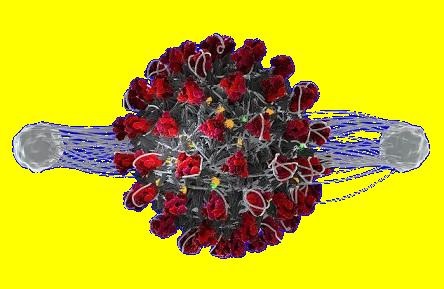Nikhil Prasad Fact checked by:Thailand Medical News Team Jun 24, 2024 1 year, 5 months, 3 weeks, 2 minutes ago
COVID-19 News: Understanding T Cells' Role in COVID-19 Recovery
New research has shed light on how T cells, a crucial part of the immune system, help people recover from COVID-19. T cells can be either protective or harmful during a SARS-CoV-2 infection, but the exact mechanisms were not well understood until now. A new study, conducted by a team of researchers from the Fifth Medical Center of PLA General Hospital in Beijing-China that is covered in this
COVID-19 News report, provides valuable insights into how T cells respond to the virus and how this response differs between moderate and severe cases of COVID-19.
 How T Cells Help Beat COVID-19: New Research Sheds Light
The Study and Its Methods
How T Cells Help Beat COVID-19: New Research Sheds Light
The Study and Its Methods
Researchers examined blood samples from nine COVID-19 patients, five with moderate disease and four with severe disease, alongside samples from nine healthy donors collected before the pandemic. They focused on 144 peptides, which are small parts of the virus's proteins, to see how T cells responded to them. These peptides spanned various SARS-CoV-2 proteins, including the spike protein, which is crucial for the virus to enter human cells.
Key Findings
The study revealed that patients with moderate COVID-19 produced more of a molecule called IFN-γ, which is important for fighting infections, compared to both healthy donors and patients with severe COVID-19. Conversely, patients with severe COVID-19 produced higher levels of another molecule called IL-17A, which is associated with inflammation and can worsen the disease.
Interestingly, a specific part of the virus, a peptide from the M protein called P120, was identified as a key target for T cells in patients with moderate COVID-19. This peptide seemed to help these patients' immune systems mount a strong response, aiding in their recovery.
Why T Cells Matter
T cells are critical in controlling viral infections, including SARS-CoV-2, the virus that causes COVID-19. Robust T-cell responses can lead to milder disease and quicker recovery. In contrast, severe COVID-19 cases often show a dysregulated T-cell response, which can contribute to more severe symptoms and prolonged illness.
The Role of IFN-γ and IL-17A
IFN-γ, or interferon-gamma, is a cytokine, a type of signaling molecule that helps coordinate the immune response. High levels of IFN-γ are typically associated with a stronger and more effective immune response against viruses. In this study, moderate COVID-19 patients had higher IFN-γ levels, which correlated with better outcomes and more effective T-cell responses.
On the other hand, IL-17A is another cytokine but is linked with inflammation. Elevated levels of IL-17A were found in patients with severe COVID-19, suggesting that this molecule might contribute to the excessive inflammation and tissue damage seen in severe cases. Understanding the balance between these cytokines can help in managing and treating COVID-19,
especially in severe cases.
Implications for Treatment and Vaccines
The findings of this study have significant implications for the development of treatments and vaccines for COVID-19. By understanding which parts of the virus elicit strong T-cell responses, researchers can design vaccines that target these areas, potentially leading to more effective and long-lasting immunity.
The identification of the P120 peptide as a dominant target for T cells in moderate COVID-19 patients is particularly promising. This peptide could be included in future vaccine designs to enhance T-cell responses and improve outcomes for patients.
Conclusion
This study provides important insights into the role of T cells in COVID-19 recovery. It highlights the differences in immune responses between moderate and severe cases, particularly the roles of IFN-γ and IL-17A. By understanding these mechanisms, researchers can develop better strategies for treating and preventing severe outcomes of SARS-CoV-2 infection. This research not only advances our understanding of COVID-19 but also paves the way for more effective vaccines and therapies in the future.
The study findings were published in the peer reviewed journal: Viruses.
https://www.mdpi.com/1999-4915/16/7/1006
For the latest
COVID-19 News, keep on logging to Thailand Medical News.
Read Also:
https://www.thailandmedical.news/news/sars-cov-2-causes-phenotypic-alterations-of-circulating-follicular-helper-t-cells-in-severe-covid-19
https://www.thailandmedical.news/news/why-your-immune-system-doesn-t-remember-covid-19-well-new-findings-on-cd4-t-cells
